Have you ever felt like if you just stop for a second, everything around you will fall apart? Like, you’re the one holding it all together, but deep down, you’re exhausted and kinda resentful? Yeah, that’s overfunctioning sneaking up on you, often as a sneaky trauma response. It’s when you take on way more than your share, thinking it’ll keep you safe from chaos or rejection.
In this piece, we’ll dig into what it really means, spot the signs you’re stuck in it, uncover those root causes from your past, and compare it to other trauma patterns like fight or flight. Stick around we’ve got some eye-opening insights, plus a handy infographic on the cycle and a comparison table to make it all click. If you’re nodding along, check out our take on why emotions can feel too much for more on handling that inner storm. For a deeper dive, here’s a solid read from Psychology Today on trauma responses. Oh, and don’t miss the infographic coming up it’s a quick visual hit on spotting this pattern before it drains you dry.

What Is Overfunctioning as a Trauma Response?
I remember this one time in college, I was up all night fixing a group project because I was convinced if I didn’t, we’d all fail and it’d be my fault somehow. Looking back, that was classic overfunctioning as a trauma response me stepping in to control everything just to avoid that sinking feeling of things going wrong.
It’s basically when you chronically take on more emotional, practical, or relational work than is fair or necessary, all to create a sense of safety in a world that once felt unpredictable. Not just being helpful; it’s like your brain’s wired to believe that constant doing is the only way to prevent disaster. And yeah, it stems from trauma, where survival meant anticipating every need or fixing every problem before it blew up.
Defining the Hidden Pressure of Constant Doing
Overfunctioning isn’t about being ambitious or responsible it’s that quiet, relentless pressure to always be the fixer, the planner, the one who never says no. You might find yourself organizing everyone’s schedules, smoothing over arguments you weren’t even part of, or working late just to feel like you’ve “earned” your peace. It’s exhausting, but here’s the kicker:
it feels normal because it’s how you learned to cope. From a psych perspective, it’s linked to hypervigilance, where your nervous system stays on high alert, scanning for threats. I once chatted with a therapist who said it’s like carrying an invisible backpack of everyone else’s stuff yours gets buried at the bottom. And honestly, it sneaks up; one day you’re just “helpful,” the next you’re burned out wondering why.

How It Differs from Healthy Responsibility
Healthy responsibility? That’s owning your stuff paying bills on time, showing up for friends without resentment, balancing give and take. But overfunctioning as a trauma response flips it: you take on everyone’s load, thinking it’ll shield you from pain or abandonment. Like, instead of asking for help, you do it all alone because relying on others feels too risky.
Picture this: a friend cancels plans, and instead of feeling mildly bummed, you spiral into fixing their mood or rescheduling everything yourself. That’s the difference healthy means mutual support; overfunctioning means you’re the safety net for all, often at your own expense. No wonder it leads to resentment… or that quiet voice whispering you’re not enough unless you’re doing more.
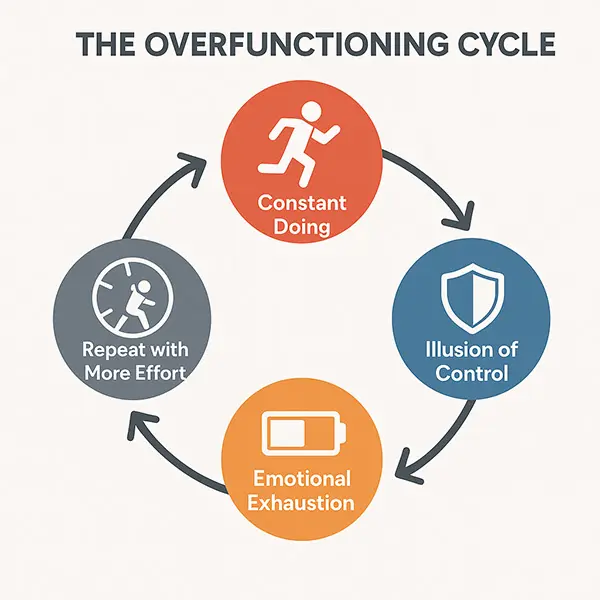
Signs You’re Overfunctioning to Feel Safe
Ever catch yourself saying “I’ve got it” even when your plate’s overflowing? That’s a big red flag for overfunctioning as a trauma response. It’s sneaky because it masquerades as strength, but underneath, it’s about feeling safe only when you’re in motion. Let’s break down some signs I bet a few will hit home, like they did for me during a rough work phase where I couldn’t sit still without anxiety creeping in.
Taking Responsibility for Others’ Emotions
You know that feeling when a loved one’s upset, and suddenly it’s your job to cheer them up, even if it’s not about you? Yeah, that’s overfunctioning kicking in. You’re not just empathetic; you’re absorbing their moods like a sponge, thinking if you fix it, everything stays stable. I did this with my family growing up always the peacemaker, diffusing arguments before they escalated. But it left me drained, resenting the very people I was “helping.” Remember, it’s okay to offer support without owning their feelings entirely.

Micromanaging Everything to Prevent Problems
If you’re the type who plans every detail double-checking emails, anticipating what could go wrong in a casual hangout that’s micromanaging as a shield. It’s like your brain says, “If I control it all, nothing bad happens.” For me, it showed up in relationships; I’d overplan dates to avoid any awkwardness, but it just made me tense. The irony? It often creates the problems you’re trying to dodge, like pushing people away with your intensity.
Neglecting Your Own Needs
Here’s a tough one: when was the last time you prioritized your rest over someone else’s request? In overfunctioning, your needs come last because saying no feels like inviting chaos. You skip meals, push through fatigue, all while priding yourself on being “reliable.” But deep down, it’s a trauma echo maybe from a childhood where your worth tied to how much you gave. I ignored my burnout for years until a friend pointed out I was running on fumes. Overfunctioning often means you’re the last on your own list, but recognizing that is the first step to change.

Feeling Unsafe or Useless When Idle
Downtime? What’s that? If sitting still makes you anxious like you’re worthless without productivity that’s a classic sign. It’s not laziness you’re avoiding; it’s the vulnerability of unstructured time, where old traumas might bubble up. I used to fill every gap with tasks, even pointless ones, just to dodge that empty feeling. Turns out, it’s hypervigilance in disguise, keeping you “safe” through constant action.
Exhaustion Disguised as Productivity Pride
You brag about your packed schedule, but inside, you’re wiped out that’s exhaustion wearing a productivity mask. Overfunctioning tricks you into thinking busyness equals value, but it’s often a trauma response to prove you’re indispensable. Pride in “handling it all” fades when crashes hit, like that time I got sick from overworking and realized it wasn’t sustainable. Watch out for that cycle; it can lead to serious burnout if ignored.
Root Causes: Why Overfunctioning Develops
Overfunctioning doesn’t just appear outta nowhere it’s rooted in past experiences that taught you doing more equals surviving better. Let’s unpack those origins; understanding them was a lightbulb moment for me, shifting from self-blame to compassion.
Unpredictable or Unsafe Early Environments
Growing up in chaos like unreliable parents or volatile homes trains you to overfunction as a kid. You learn to anticipate needs, clean up messes, to create some semblance of stability. It’s survival mode: if you handle everything, maybe the bad stuff stops. As an adult, it lingers, making calm feel suspicious. For LGBTQ+ folks, this might amp up if family rejection added layers of unpredictability, pushing you to overperform for acceptance elsewhere.

Caregiving Roles Too Early in Life
If you were the “parentified” child cooking for siblings, emotional support for adults you internalized that your role is to carry the load. It’s not chosen; it’s thrust upon you, wiring overfunctioning as default. I saw this in a friend who babysat her siblings young; now she can’t stop mothering everyone, even at work. In queer communities, this might show as over-nurturing chosen family to compensate for lost bio ties, but it drains if unbalanced.
Hypervigilance and the Illusion of Safety
Hypervigilance from trauma keeps your radar on 24/7, scanning for threats. Overfunctioning becomes the tool: if you fix potential issues first, safety’s yours. But it’s an illusion true safety isn’t in control, it’s in trust. That constant alert state? It spikes cortisol, messing with health, as noted in studies on trauma survivors.
Perfectionism and Productivity as Protection
Perfectionism ties in here: flaws feel dangerous, so you overdo to avoid criticism or failure. Productivity protects against that inner critic echoing past traumas. “If I’m perfect, I’m safe,” your brain says. But it backfires, breeding anxiety. Breaking it starts with small imperfections on purpose like leaving a dish undone and seeing the world doesn’t end.

Comparing Overfunctioning to Other Trauma Responses
Trauma responses aren’t one-size-fits-all; overfunctioning slots in uniquely among the classics. Let’s compare it helped me see it’s not “just me being Type A.”
Fight, Flight, Freeze, and Fawn Explained
Fight: Confronting threats head-on, like arguing back. Flight: Running from danger, physically or mentally escaping. Freeze: Shutting down, going numb to survive. Fawn: People-pleasing to appease, blending in to avoid harm. Each is a nervous system hack for protection.
Where Overfunctioning Fits Among Trauma Patterns
Overfunctioning overlaps with fawn but amps it with action it’s proactive pleasing through doing. Unlike freeze’s paralysis, it’s hyperactive; not flight’s escape, but staying to control. It’s like fight but internalized, battling chaos by overmanaging. In essence, it’s a “do” response in a world of react modes.
🟨
| Trauma Response | Key Behavior | Emotional Driver | Common Outcome |
|---|---|---|---|
| Fight | Confrontation, aggression | Anger/fear | Empowerment or escalation |
| Flight | Avoidance, escaping | Anxiety/panic | Temporary relief, isolation |
| Freeze | Shutdown, numbness | Overwhelm | Stagnation, dissociation |
| Fawn | Pleasing, accommodating | Insecurity | Resentment, loss of self |
| Overfunctioning | Overdoing, controlling | Hypervigilance | Exhaustion, burnout |
Ever wonder why you’re always the fixer, exhausted but can’t stop? Dive into overfunctioning as a trauma response uncover signs, causes, and comparisons for real insight.
Stages of Breaking Free from Overfunctioning
Okay, so you’ve spotted the overfunctioning trap now what? Breaking free isn’t some overnight magic; it’s more like peeling an onion, layer by layer, with a few tears along the way. I remember starting this journey myself after a burnout crash that left me staring at the ceiling, wondering why resting felt like a crime. We’ll walk through these stages gently, from validating why you started this pattern to reclaiming your downtime. It’s not about shaming yourself; it’s about understanding it served you once, but now? Time to let go. For more on spotting those emotional layers, peek at our piece on why you feel too emotional. And hey, this Harvard Health article on easing stress in traumatic times hits home on why these shifts matter.

Overfunctioning as a Trauma Response: Why You’re Always Doing Too Much and How to Break Free
Validating the Protective Roots
First off, you gotta acknowledge that overfunctioning wasn’t some random habit you picked up it was your brain’s clever way to shield you from pain. Like, back in my early twenties, I overfunctioned at work because growing up, chaos at home meant I had to step up or everything crumbled. Validating that? It’s saying, “Hey, this kept me safe once, thanks for that.” Without it, you’ll just beat yourself up trying to change.
Start by journaling one memory where doing more saved the day then forgive yourself for carrying it too long. In the LGBTQ+ community, this validation hits different; maybe you overfunctioned to prove your worth in unaccepting spaces, like hiding your true self by being the “perfect” friend or partner. It’s exhausting, but recognizing it as protection? That’s the door to freedom.

From a neuroscience angle, overfunctioning ties to the amygdala’s hyperdrive in trauma survivors that fight-or-flight center stays lit, pumping cortisol like it’s party time, tricking you into thinking busyness equals safety. Studies show somatic awareness can rewire this, calming the nervous system over time. But hey, if you’re thinking “This validation stuff sounds fluffy,” trust me, skipping it means the pattern sneaks back in.
Anchoring Nervous System Safety in Stillness
Once you’ve validated, it’s time to teach your body that stillness isn’t the enemy. My trick? Sitting with a cup of tea, eyes closed, feeling my breath without jumping up to “fix” something. It’s anchoring training your nervous system to feel safe without action. Try polyvagal exercises, like humming or rocking gently; they signal to your vagus nerve that all’s well. For queer folks, this might mean creating safe spaces where you don’t have to perform, like a quiet corner with affirming art. Honestly, if stillness scares you at first, that’s normal your brain’s wired for vigilance, but with practice, it shifts to rest mode.
Separating Responsibility From Self-Worth
Here’s where it gets real: untangling your worth from how much you do. I used to think if I wasn’t the go-to fixer, I’d be worthless classic trauma echo. Start by listing what you’re not responsible for, like others’ moods or perfect outcomes. Repeat: “My value isn’t in my output.” It feels weird at first, like wearing shoes on the wrong feet, but over time? Liberation. And yeah, therapy helped me see this separation isn’t selfish; it’s healthy.

Building Capacity for Uncertainty
Uncertainty? That’s the big bad wolf for overfunctioners. Building tolerance means sitting with “what ifs” without controlling them. I started small: not checking emails after 7 PM, letting the unknown simmer. It built resilience, like muscle memory for trust. From psych lit, this echoes exposure therapy gradual doses rewire fear responses. If you’re in the LGBTQ+ world, uncertainty might tie to identity shifts; practicing here fosters self-trust beyond external validation.
Reclaiming Rest as Healing, Not Laziness
Rest isn’t lazy it’s radical healing. I fought this hard; my brain screamed “useless!” during naps. But reclaiming it? Try scheduling “nothing time,” like 10 minutes staring at clouds. It’s rewiring that guilt. Watch out if rest triggers panic that’s a sign to go slow, maybe with a therapist. Science backs it: rest drops cortisol, letting your prefrontal cortex (decision-maker) recharge, per Harvard studies.

Seeking Support Through Somatic Therapies
Don’t go solo somatic therapies rock for this. They focus on body-held trauma, like Somatic Experiencing, where you track sensations to release stuck energy. I tried it after reading Verywell Mind’s guide on somatic therapy, and wow, it shifted my hypervigilance. For example, a therapist might guide you to notice tension in your shoulders (from carrying everyone’s load) and breathe it out. It’s not talk-only; it’s body-first, perfect for overfunctioners who intellectualize everything.
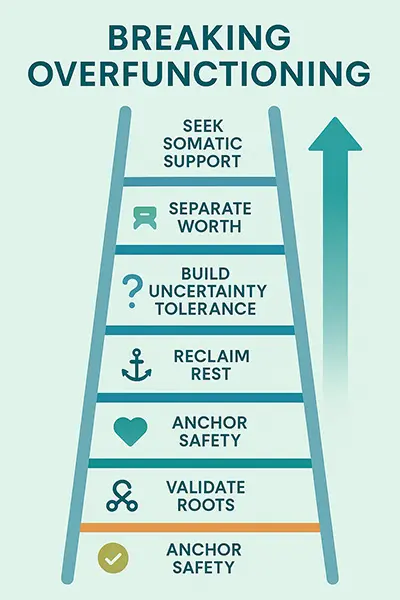
Practical Tools and Exercises to Unwind Overfunctioning
Tools time! These aren’t quick fixes but everyday tweaks to unwind the pattern. I swear by them started with pauses that felt awkward, now they’re my lifeline. Let’s dive in; pair this with our mental self-care guide for extra oomph.
Short Intentional Pauses Daily
Pause for 2-5 minutes, no agenda. Set a timer, sit, notice your breath. When urges to “do” hit, label them: “That’s the old protector talking.” It builds stillness muscle. Simple, but potent like hitting reset on your nervous system.

Soothing Sensory Practices (Tea, Weighted Blanket, Music)
Engage senses to ground: sip warm tea slowly, feeling the heat; wrap in a weighted blanket for pressure that says “safe”; play soft music that calms. I use ambient tracks during breaks melts the tension. These trick your body into rest mode, bypassing the mind’s chatter.
Journaling Triggers and Urges to Control
Journal daily: “What triggered my urge to overfunction today? What fear lurks underneath?” Be honest no judgments. It uncovers patterns, like how loneliness sparks my fixing mode. Over time, urges fade as awareness grows.
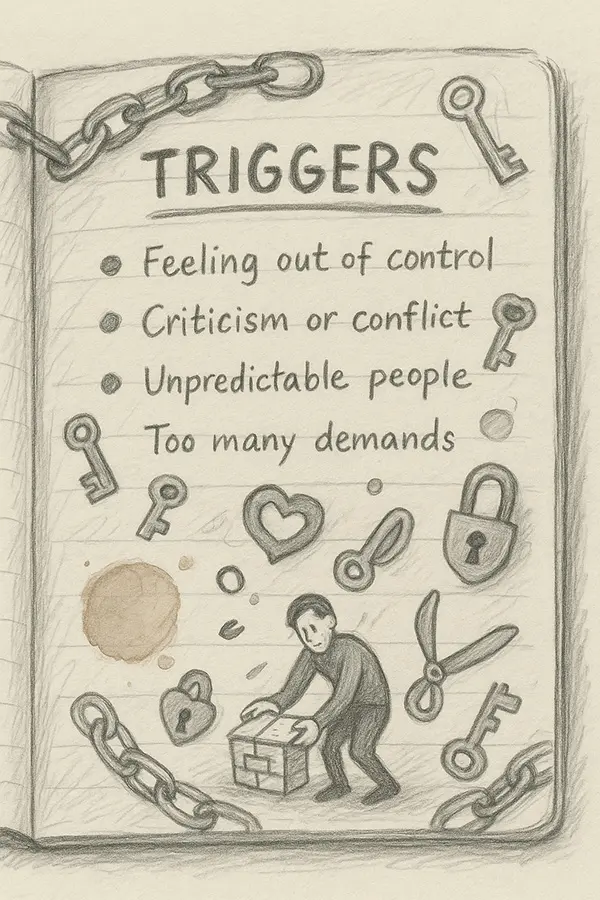
Gentle Boundary-Setting Practices
Practice saying “no” softly: “I can’t take that on right now.” Start with low-stakes, like declining a casual invite. It teaches others (and you) that boundaries aren’t rejection. If guilt creeps, remind: “This protects my energy.”
Real-Life Scenarios and Case Studies
Stories make it stick here’s how overfunctioning played out in real lives, including shifts that worked. Relate? You’re not alone.
Story: “If I Stay Busy, I’ll Stay Safe”
Take Sarah, a queer artist I know: post-coming out trauma, she overfunctioned in relationships, planning everything to avoid abandonment vibes. “If I’m indispensable, they won’t leave,” she’d say. But it led to resentment partners felt smothered. Her aha? Realizing busyness masked vulnerability.
How Therapy Shifted the Pattern
In therapy, Sarah explored somatic work feeling body cues during “idle” moments. It rewired her; now she delegates, rests without guilt. Like in Psychology Today’s piece on overfunctioning, therapy spotlights these dynamics for change. If you’re thinking “Therapy? Too pricey,” start with free resources or groups.

Checklist for Recognizing and Reducing Overfunctioning
🟨
- ☐ Do I feel guilty resting, like the world might collapse?
- ☐ Am I fixing others’ problems more than my own?
- ☐ Does stillness feel unsafe or unproductive?
- ☐ Do I micromanage to avoid surprises?
- ☐ Is exhaustion my badge of honor?
- ☐ Have I neglected my needs for “helping” others?
Warning Signs and When to Seek Help
Spot these red flags? Don’t ignore they’re your cue to reach out. Better safe than spiraling.
If Rest Feels Impossible
If even short breaks spike anxiety, like your mind races to disasters, that’s deep-rooted. This could signal unresolved trauma don’t push through; seek pro help.

If Physical Symptoms Appear (Insomnia, Fatigue, Anxiety)
Body screams what mind ignores: insomnia from hypervigilance, chronic fatigue, or anxiety attacks. I hit this wall turns out, overfunctioning spikes stress hormones. Check Harvard’s trauma health link for why.
If Relationships Are Strained by Over-Control
When loved ones pull away ’cause you’re always “helping” without ask, or resentment builds? Time for support. Therapy, like somatic, can mend this rebuilding trust in shared loads.
Research, Studies, and Statistics on Overfunctioning
Diving into the nitty gritty of research always feels like peeling back layers on something you’ve lived but never quite named. I mean, overfunctioning isn’t just a buzzword its backed by studies showing how trauma rewires our brains toward constant productivity. Let’s unpack some key findings here, from roots in early chaos to how it ties into that endless hustle.
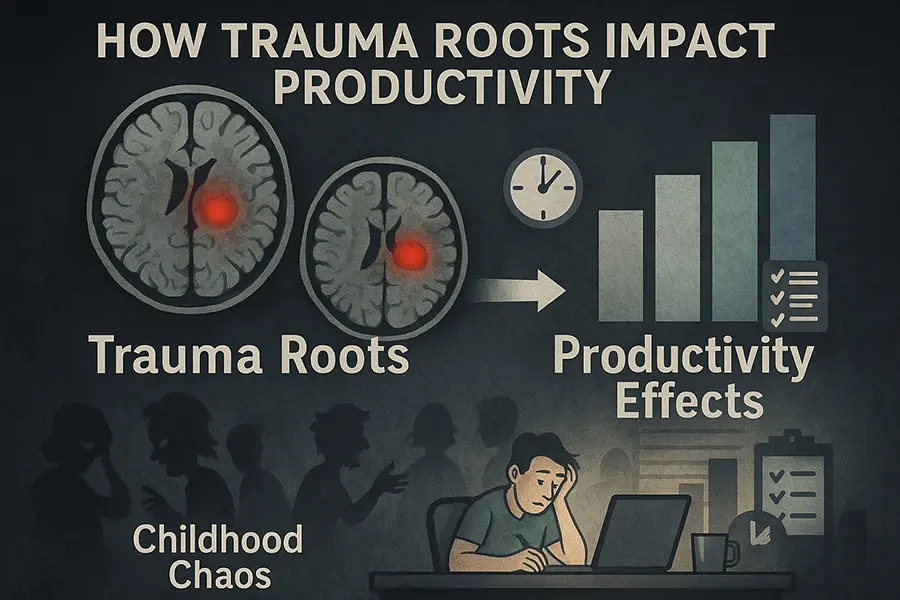
If you’re feeling seen, maybe check our take on knowing yourself for better self-care it digs into similar patterns of ignoring inner signals. And for a solid external read, Psych Central’s piece on productivity as trauma coping nails it with real talk. Oh, and keep an eye out for the infographic coming up its a quick visual on trauma stats that might hit home.
Trauma Roots and Productivity Patterns
So, turns out overfunctioning often sprouts from childhood messups where you had to step up way too early. Like, one study on childhood trauma and work functioning found that folks with high trauma scores showed way poorer cognitive performance in adulthood think foggy brain from always being on alert. I recall reading about how unpredictable homes wire us for hypervigilance, making downtime feel like danger. Another bit from a baseline survey: 44.8% of workers reported childhood trauma, and those with the worst experiences had way more trouble at jobs, like overdoing to compensate.
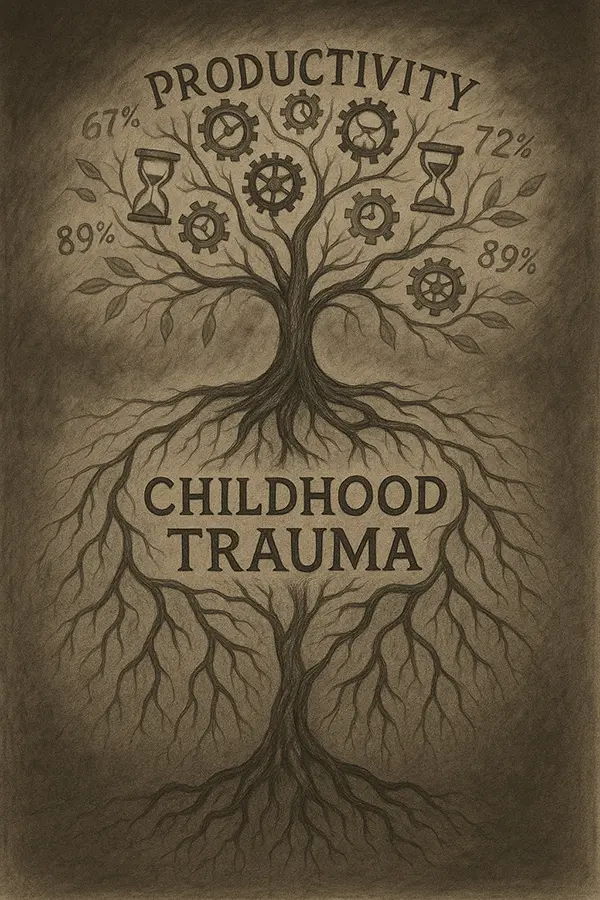
It’s not just numbers; it’s that productivity becomes a shield. From a neuro angle, trauma amps the hypothalamic-pituitary-adrenal axis, pumping cortisol that keeps you in “do mode” to avoid feeling vulnerable. Honestly, if you’re always busy to dodge emotions, that’s classic high-functioning trauma where output masks the pain. In queer circles, this might double down with identity stress, pushing overperformance to fit in or prove worth. Ever felt that? Yeah, studies link it to PTSD manifestations, like constant busyness as avoidance. Kinda wild how our brains adapt, huh?
Somatic Therapies and Nervous System Healing
Now, on flipping the script with somatic stuff its all about body-first healing, not just talk. Research shows somatic experiencing (SE) tweaks interoceptive sensations, helping dump stuck trauma energy. I tried some basics once during a rough patch, like noticing tension in my chest while breathing slow it eased that constant urge to fix everything.

Stats wise, while hard numbers on overfunctioning are sparse, trauma therapies like SE cut PTSD symptoms by regulating the nervous system, per Harvard. One review highlighted how it rebuilds safety, reducing burnout from overdoing. From neuroscience, it calms the vagus nerve, dropping fight-or-flight mode that fuels hypervigilance. Try simple exercises like grounding feet on floor; studies say it boosts resilience over time. For LGBTQ+ peeps, somatic work can address layered traumas like discrimination, fostering body trust without the need to overperform. Pretty empowering, right? 😌
Frequently Asked Questions (FAQ)
Got questions bubbling up? You’re not alone overfunctioning trips up tons of folks. Here’s some straight talk on common ones, pulled from real experiences and psych insights. We’ll cover everything from basics to how-tos, no fluff.

Yep, absolutely. Over-responsibility often stems from trauma where you learned taking on everything kept things stable. Like, if home was chaotic, you might’ve become the fixer to survive. Studies tie it to hypervigilance, where your brain equates control with safety.
But heres the thing: it’s not strength; it’s survival mode on loop. If you’re always saying yes to avoid guilt, that could be it. Watch out if it leaves you resentful thats a sign its unhealthy. Start by noticing patterns maybe journal one “no” a week.
High-functioning trauma? It’s when you’re killing it on the outside work, social stuff but inside, trauma’s pulling strings. You overfunction to mask pain, but burnout sneaks in. Research shows folks like this overlook stress until crash time, often from early high expectations.
Think: the “reliable” one who’s secretly exhausted. For queer individuals, it might show as overachieving to counter stigma. Not a flex, though healing starts with admitting it’s there.
Oh yeah, overexplaining can totally be a trauma thing. It’s like fawning on steroids justifying every move to avoid conflict or rejection. Roots in environments where you had to “prove” yourself constantly. Psych lit links it to anxiety contagion, where overfunctioners spill words to feel safe. I used to ramble excuses at work, fearing missteps. To curb it, pause and ask: “Is this needed?” Simple, but game-changing.
A hyper response? That’s when trauma amps your system into overdrive constant alertness, overdoing, or emotional floods. Unlike freeze, it’s action-packed, like overfunctioning to preempt threats.
Neuroscience says it hijacks the amygdala, spiking adrenaline. Stats show childhood trauma boosts this in 44% of affected adults. Calming it? Somatic breaths or therapy to reset.
Examples? Plenty. Like, always planning family stuff ’cause “no one else will,” or micromanaging at work to dodge fails. Or emotionally, soaking up friends’ drama as your own.
In relationships, it’s doing all chores without ask, breeding resentment. I once organized a whole trip solo, exhausted but “helpful.” Spot it if rest feels wrong.
Stopping? Slow and steady. Validate roots first, then practice pauses like 5-min breathwork. Set boundaries: “I can’t right now.” Somatic therapy helps release body-held tension.
Build uncertainty tolerance by letting small things slide. Journal urges daily; it shrinks them over time. If in LGBTQ+ spaces, find affirming groups to share loads without overdoing.
Emotional overfunctioning means carrying others’ feelings like your backpack always the listener, fixer, without reciprocity. Ties to trauma where emotions were unsafe, so you control via empathy overload. Leads to burnout, as studies on overfunctioners show. Differs from healthy support by the resentment it brews.
Unhealthy responses? Stuff like avoidance, overfunctioning, or numbing that prolongs pain. Unlike adaptive coping, these trap you in cycles. Stats link childhood trauma to poorer work function, amplifying issues. If it’s straining relationships or health, thats unhealthy seek help to shift.
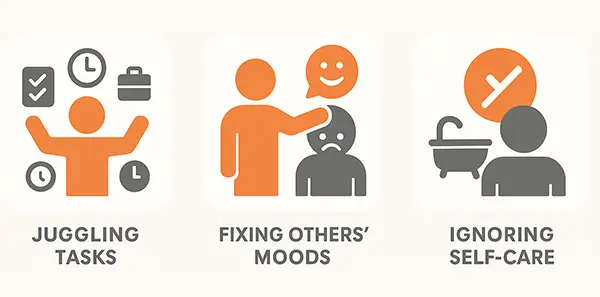
Resources and Helpful Links
Wrapping up, if overfunctioning rings bells, dive deeper with these. For internal gems, our spot on people-pleasing and emotional exhaustion ties right in with boundary tips. Externally, Brené Brown’s podcast on over/under-functioning is gold for calm vibes. Also, Trauma Healing’s somatic resources for nervous system work. And don’t skip MHA’s overfunctioning blog for burnout avoidance. 😊 These helped me tons; hope they do for you.
✨ Last updated on 13.09.2025











Leave a Reply